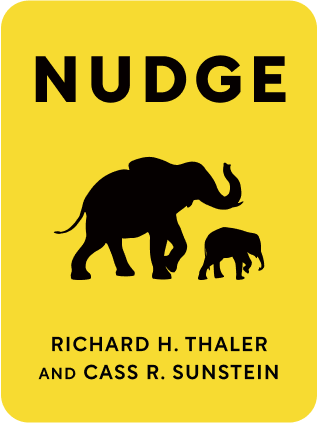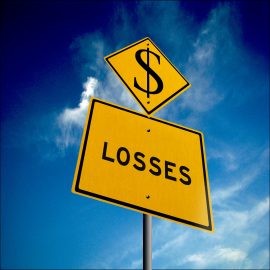

This article is an excerpt from the Shortform summary of "Nudge" by Richard H. Thaler and Cass R. Sunstein. Shortform has the world's best summaries of books you should be reading.
Like this article? Sign up for a free trial here .
Are you considering reading Nudge by Richard H. Thaler and Cass R. Sunstein? Do you want to read a Nudge book review before you make the purchase?
In Nudge, the authors explain that people are not the eminently rational beings that appear in most economic theories—so-called homo economicus—but instead, are fallible and often irrational economic actors prone to all sorts of biases. This book was revolutionary and even influenced policymakers when it came out in 2008.
Keep reading for a full Nudge review with commentary on its approach and context.
Review of the Book Nudge
We will begin our Nudge book review with a brief overview of the book. In Nudge, Richard H. Thaler and Cass R. Sunstein propose a series of reforms—“nudges”—that can help policymakers and other choice designers lead people to make better choices without restricting their freedom to choose. Thaler and Sunstein’s premise is that no choice is ever neutral because the way a choice is presented, even if randomly, affects the way people engage with it—and so governments, private companies, and other entities should frame options in ways that can improve people’s decisions. Thaler and Sunstein call their approach to designing choices “libertarian paternalism,” which implies the freedom of libertarianism combined with the goodwill of paternalism.
In this book, you’ll learn how flesh-and-blood humans differ from the humans studied in economics, why people make bad investment choices, and how Thaler and Sunstein propose to revitalize the institution of marriage (by abolishing it). You’ll also find commentary on the psychological research underlying Nudge’s concepts as well as more recent data that sheds new light on Thaler and Sunstein’s findings.
Richard H. Thaler
Richard H. Thaler is the Charles R. Walgreen Distinguished Service Professor of Behavioral Science and Economics at the University of Chicago’s Booth School of Business and a research associate at the National Bureau of Economic Research. Educated in economics at Case Western University and the University of Rochester, Thaler is a member of the National Academy of Science and has served as president of the American Economic Association. He won the Nobel Memorial Prize in Economic Sciences in 2017.
Thaler followed Nudge (2008) with Misbehaving: The Making of Behavioral Economics (2015), part memoir and part critique of traditional economic theory.
Cass R. Sunstein
Cass R. Sunstein is a professor at Harvard Law School and the founder and director of the Program on Behavioral Economics and Public Policy there. Sunstein holds a BA from Harvard College and a JD from Harvard Law School and has taught at the University of Chicago. He also clerked for Supreme Court Justice Thurgood Marshall.
The author of hundreds of articles and dozens of books, Sunstein is known among legal scholars as an expert in constitutional law (he is the coauthor of a constitutional law casebook widely used in US law schools). He is also one of the most-cited legal scholars of all time for his work on constitutional, administrative, and environmental law.
In early 2009, Sunstein was named President Obama’s regulatory czar in the White House Office of Information and Regulatory Affairs (OIRA), which oversees all federal regulations. Because of Sunstein’s support of libertarian paternalism, his appointment drew critics from both the left and the right.
Since the publication of Nudge, Sunstein has continued to write books for popular audiences, among them Simpler: The Future of Government (2013) and The World According to Star Wars (2016), which made the New York Times bestseller list. In 2018, he received the Holberg Prize from the Norwegian government, an award often described as the Nobel Prize for the law and humanities.
The Book’s Publication and Context
Nudge was published by Yale University Press in 2008 and released in paperback by Penguin Random House in 2009.
The Book’s Context
Thaler was heavily influenced by psychologists Daniel Kahneman (author of Thinking, Fast and Slow) and Amos Tversky, with whom he worked at Stanford University. Building off their work, Thaler applied the concepts of behavioral psychology to economics, resulting in a new field: behavioral economics.
Nudge is grounded in this field. Its foundational premise is that people are not the eminently rational beings that appear in most economic theories—so-called homo economicus—but instead, are fallible and often irrational economic actors prone to all sorts of biases. Because people are naturally disposed to making mistakes, Thaler and Sunstein argue, they need to be “nudged” toward the most beneficial decisions.
The book covers much of the same ground as other investigations of human behavior and cognitive biases. For example, Thaler and Sunstein describe two systems of brain functioning: the “Automatic System” and the “Reflective System.” These two systems are similar to Kahneman’s “System 1” (thinking fast) and “System 2” (thinking slow). The two systems theory also plays an integral role in Philip E. Tetlock and Dan Gardner’s Superforecasting and Nassim Nicholas Taleb’s The Black Swan.
Nudge departs from other accounts of cognitive biases in its examples and proposed solutions. Thaler and Sunstein’s object is to teach choice designers—public and private policy makers—how they can “nudge” people toward better choices.
The Book’s Impact
Upon its release, Nudge was reviewed by a host of periodicals, including The New York Times, The Guardian, The New Yorker, and The Sunday Times (London). The Economist picked Nudge as one of the best books of 2008.
As its authors intended, the book also had an influence on policymakers. As noted above, Sunstein was appointed by President Obama to apply libertarian paternalism approaches to US federal regulations. Additionally, the UK established a “Behavioral Insights Team”—colloquially known as the “Nudge Unit”—in 2010 to help British citizens make better choices through nudges.
Critical Reception
Positive reviewers of Nudge lauded the authors’ ability to make academic research accessible to a popular audience and largely agreed with the book’s argument that, because people are liable to make decisions that don’t serve their best interest, choice designers and policymakers should use non-coercive measures like nudges to improve people’s choices.
Reviewers also had critiques of the book. In The Guardian, policy analyst and Brookings Institution fellow Richard V. Reeves found some of the book’s examples “trivial” as well as controversial. For example, he took issue with Thaler and Sunstein’s suggestion that governments institute mandatory waiting periods before their citizens could get married (to help reduce divorce rates). For Reeves, a nudge like this brings libertarian paternalism closer to paternalism than libertarianism.
In The New York Times, Harvard economics professor Benjamin M. Friedman minimized Thaler and Sunstein’s contribution as simply proving that “common sense” exists. For Friedman, many of the nudges suggested by Thaler and Sunstein—for example, making “yes” to organ donation the default rather than “no,” or making employees opt out of regular contributions to a retirement plan rather than opt in—would be obvious to anyone with a bit of common sense.
Behavioral economics in general, too, has come in for criticism. On the scholarly side, academic economists and psychologists have questioned the validity of behavioral economists’ experiments and their interpretation of the experimental results. For example, psychologist Gerd Gigerenzer argues that libertarian paternalism overstates people’s irrationality and selectively reports research findings.
Critiques of behavioral economics have also appeared in publications for general readers. In The New York Times, University of Illinois at Chicago professor of marketing David Gal argues that behavioral economists concentrate too much on how human behavior deviates from standard economic models and give short shrift to explanations why it does. Gal also notes that the evidence for the effectiveness of nudges is scant.
In a review of two of Sunstein’s later books, NYU law professor Jeremy Waldron wonders whether Thaler and Sunstein skirt the ways in which entities, especially governments, could use nudges for ill. In another, Yale law professor Samuel Moyn questions the effectiveness of nudges when an entire social system disadvantages certain people.
Commentary on the Book’s Approach
Thaler and Sunstein write accessibly and, often, humorously. One way the authors engage readers is by beginning chapters with effective examples of the cognitive bias or behavioral foible they’re focusing on. For instance, they open by inviting readers to look at two drawings of a table. At first glance, the tables seem to be quite different: the one on the left appears to be long and narrow, the one on the right shorter, with sides of more equal length. But, in fact, the tables are of equal size; they look different because of the way they’re positioned on the page. This illustrates that certain errors of judgment are human nature.
In general, each nudge that the authors discuss is tied to a specific cognitive bias drawn from the behavioral psychology literature. For example, nudges to help increase the number of organ donors rely on “status quo bias”—the idea that people will typically not change the default setting that’s selected for them. However, the authors often suggest nudges but don’t explicitly connect them to any specific cognitive bias.
Commentary on the Book’s Organization
Nudge’s structure gives the reader a solid grounding in the concepts Thaler and Sunstein will be using before illustrating the real-life applications:
- Part 1 summarizes the most useful insights yielded by behavioral psychology and economics and defines their key terms.
- Parts 2-4 discuss specific areas in which nudges could improve outcomes. The areas the authors cover comprise personal finance, health, and social institutions.
- Part 5 offers additional nudges, and it attempts to preempt critics by answering the potential objections to libertarian paternalism.
There are drawbacks to this structure, however. One is that it separates the in-depth discussion of particular biases from the nudges in Parts 2-4. Although the authors will (occasionally) refer to the cognitive bias their proposed nudge corresponds to, the nudge often seems decoupled from the science that explains it. Indeed, most of the nudges on which the authors concentrate are really responding to only one or two cognitive biases. That is, many of the specific biases and decision errors the authors discuss in Part I aren’t germane to the nudges they discuss in Parts 2-4. (Or, to put it another way, many of the nudges the authors discuss aren’t grounded in any particular cognitive bias.)
The nudge sections also lose a bit of focus as they progress. For example, the most consistent section of the book is Part 2—titled “Money”—which describes a series of nudges that can help people better save for retirement, invest, and manage credit card debt. The next part, titled “Health,” includes a section on improving the environment, which is only tangentially related to health. Part 3, titled “Freedom,” is a grab bag of nudges whose only common thread is their effect on social institutions. (In evangelizing for libertarian paternalism, the authors are noticeably “nudge happy”—for them, almost any idea or reform can be categorized as a type of nudge, and every nudge is worthy of mention.)

———End of Preview———
Like what you just read? Read the rest of the world's best summary of Richard H. Thaler and Cass R. Sunstein's "Nudge" at Shortform .
Here's what you'll find in our full Nudge summary :
- Why subtle changes, like switching the order of two choices, can dramatically change your response
- How to increase the organ donation rate by over 50% through one simple change
- The best way for society to balance individual freedom with social welfare






